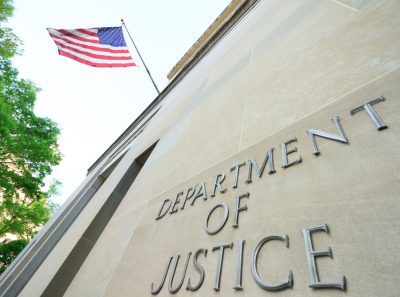Due Process and the Courts
What does the constitution say about due process?
The Fifth Amendment to the Constitution says clearly that no person shall be deprived of life, liberty, or property without the due process of law. Note that this says person, not citizen, and over the years the Supreme Court has consistently ruled that the Due Process Clause applies to all people in the United States.Do non-citizens have the right to due process in the U.S.?
Yes. The Constitution guarantees due process rights to all "persons," not just citizens. This means non-citizens, including undocumented immigrants, are entitled to fair treatment under the law. This includes the right to defend themselves in court. But recent Trump administration policies that speed up deportations and limit access to legal representation make it harder for non-citizens to get their fair day in court.- Access to legal representation Access to legal counsel is an essential part of our justice system and our democracy. In the criminal justice system, anyone facing even one day in jail gets a lawyer if they can't afford one. But immigrants facing deportation usually don't get that chance.The research is clear – the most effective way to ensure some level of due process for people navigating our complicated immigration system is for them to have trained attorney at their side. But Trump administration is now working to strip attorneys from as many people as possible, all in the name of increasing its deportation numbers. This attempt to eliminate basic due process will hurt people who already have few options.
- Fair day in court Due process guarantees that individuals have the opportunity to defend themselves in court. This includes non-citizens facing deportation.
Why is due process important?
We are seeing right now the importance of due process when it comes to President Trump's actions to carry out the so-called Alien Enemies Act, a 1798 wartime law that permits people to be deported outside of the normal framework of immigration law. President Trump has alleged that this law allows him to simply point at any person, declare them to be an alien enemy, and kick them out of the country without ever having a chance to see a judge. Thankfully, the Supreme Court said that is not true, and in a unanimous decision, ruled that people can challenge the Trump administration's invocation of the Alien Enemies Act. That is why due process is so important, because it means that no person can be rounded up and sent to another country without a chance to go to court and make the government prove their case.How is the American Immigration Council working to protect due process?
- We serve thousands of individuals in immigration detention centers through the Immigration Justice Campaign, our initiative with the American Immigration Lawyers Association. The Justice Campaign provides free legal services for immigrants who would otherwise have to navigate our complicated immigration system without a lawyer.
- We use the courts to demand a fair process for immigrants. Our litigation team is fighting back against the Trump administration’s blatant disregard for due process including filing a lawsuit challenging their illegal detention of immigrants in El Salvador’s notorious Terrorism Confinement Center (CECOT).

The Department of Justice is Restructuring Immigration Courts in Secret
The Trump administration has steadily implemented initiatives to restructure the immigration court system without providing much information to the public. The lack of government transparency around these changes is especially important because they compromise fairness in the courts. The Department of Justice (DOJ) oversees the Executive Office for Immigration Review… Read More

FOIA Request Seeks Information About the Secretive Expansion of Immigration Courts
The American Immigration Council filed a Freedom of Information Act (FOIA) request with the Executive Office for Immigration Review (EOIR) seeking information relating to the expansion and creation of new immigration courts. The FOIA request was filed along with the American Immigration Lawyers Association (AILA), National Immigrant Justice Center (NIJC)… Read More

Letter to Department of Homeland Security Urges End to Migrant Protection Protocols
153 legal representation, refugee assistance, faith-based, human rights, and community groups—including the American Immigration Council—sent a letter to the Department of Homeland Security demanding an end to the “Migrant Protection Protocols.” The letter urges the government to allow asylum seekers to pursue refugee protection from safety in the United States… Read More

Judge Voids USCIS Asylum Policies Because Ken Cuccinelli Wasn’t Appointed Legally
The Trump administration suffered another blow on Sunday, when a federal judge in Washington D.C. ruled that Ken Cuccinelli was unlawfully appointed to the role of acting director of U.S. Citizenship and Immigration Services (USCIS). The ruling voids two asylum policies Cuccinelli had signed off on. Read More

Supreme Court Rules Parents of Slain Teenager Can’t Sue Border Patrol Agent Responsible for His Death
The Supreme Court affirmed the dismissal of a lawsuit seeking damages from a U.S. Border Patrol agent who shot and killed a teenager across the U.S.-Mexico border. With this latest decision in the Hernandez v. Mesa case, the Court removed an important check on an agency… Read More

Ruling on Migrant Protection Protocols Is a Step Forward in Restoring the Rule of Law at the Border
The Ninth Circuit Court of Appeals blocked the Trump administration’s Migrant Protection Protocols, also known as the “Remain in Mexico” program. Nearly 60,000 people seeking asylum in the United States have been returned to Mexico to wait for their U.S. court hearings under MPP. Read More

Judge Stops DHS From Arresting US Citizens’ Foreign Spouses During Marriage Interviews in Maryland
The U.S. Department of Homeland Security (DHS) has been targeting U.S. citizens’ foreign spouses when they apply for legal immigration status. Earlier this month, a federal judge in Maryland put a halt to this practice. For the past few years, couples attending interviews about their marriages sometimes faced a terrible… Read More

How Will Conditions in Border Patrol Facilities Change Now That a Judge Has Ruled Them Unconstitutional?
A federal court found on Wednesday that U.S. Border Patrol may not detain migrants held in its facilities in Arizona’s Tucson Sector longer than 48 hours without providing for their “basic human needs.” This includes providing beds, blankets, food, water, personal hygiene, and medical care. Federal Judge Bury determined the… Read More

These Humanitarian Aid Workers’ Convictions Were Overturned. Here’s How It Sets Precedent for Future Protection.
A federal judge in Arizona reversed convictions of four volunteers of the humanitarian aid group No More Deaths last week. No More Deaths is an Arizona-based group that works to end death and suffering for people crossing the U.S.-Mexico border. In the summer of 2017, the… Read More

USCIS’ Change to How ‘Unlawful Presence’ Is Calculated Is Defeated in Court
A federal district court stopped U.S. Citizenship and Immigration Services (USCIS) from drastically changing how the agency determines when a foreign student or exchange visitor is “unlawfully present” in the United States. “Unlawful presence” is defined by law as any time a foreign national spends in the United States after… Read More
Make a contribution
Make a direct impact on the lives of immigrants.
